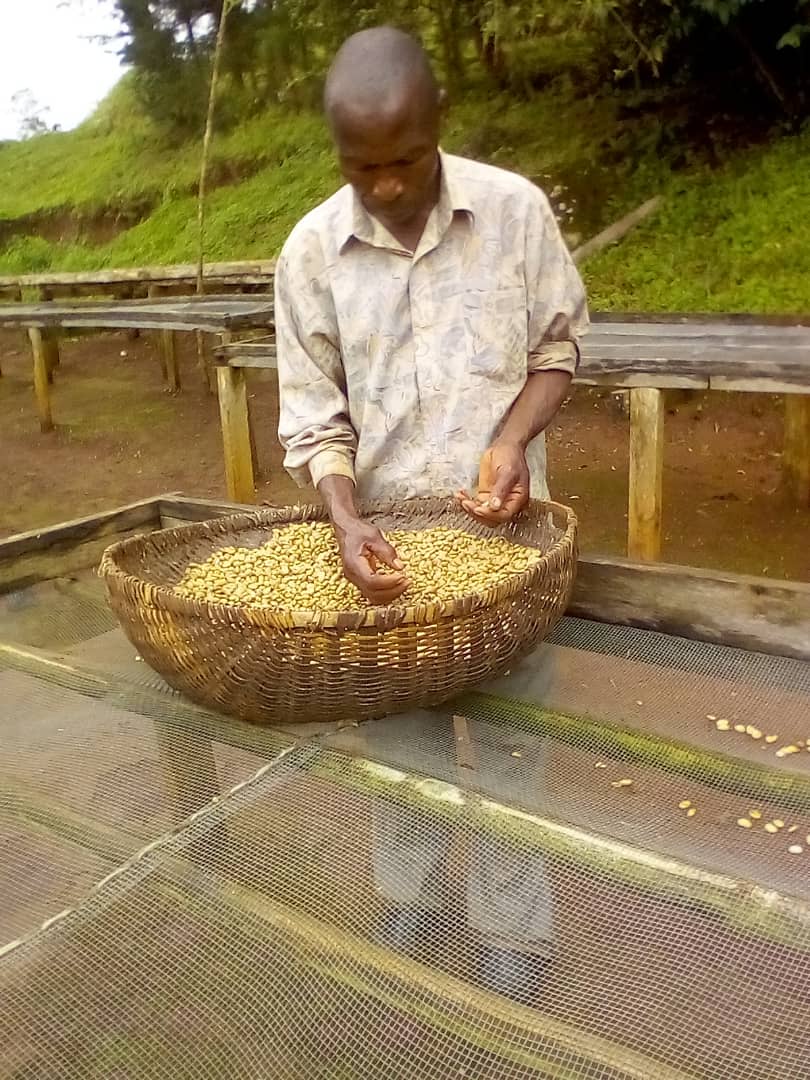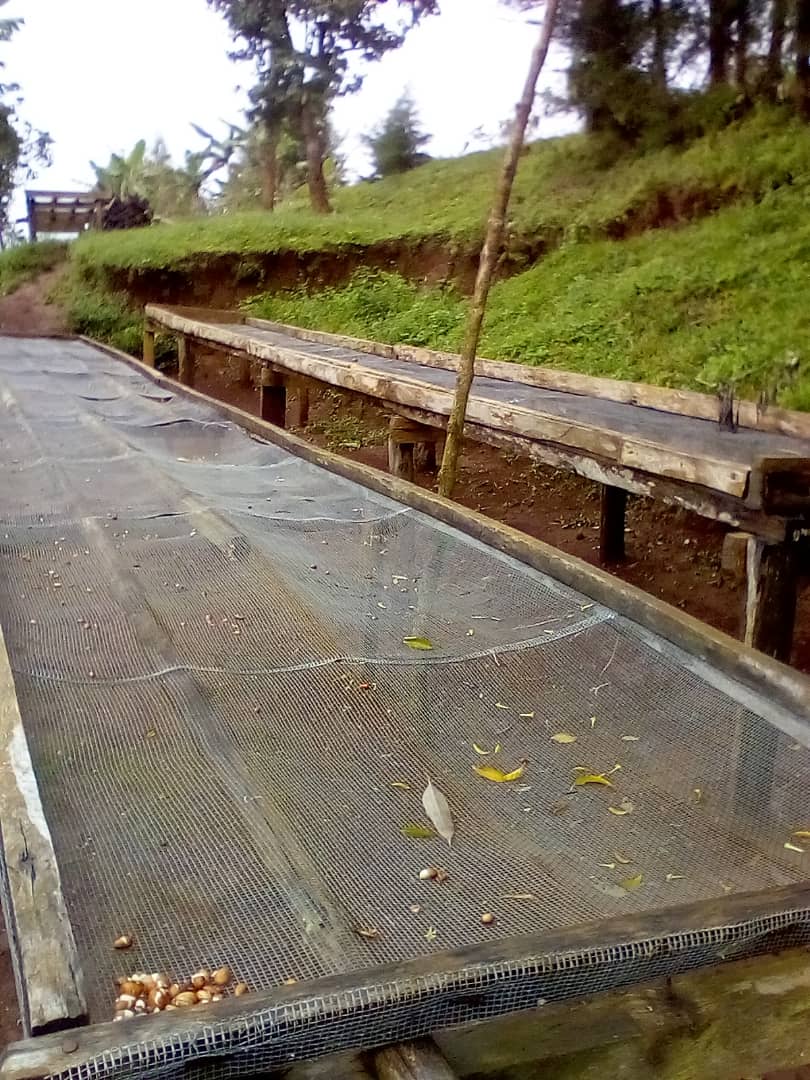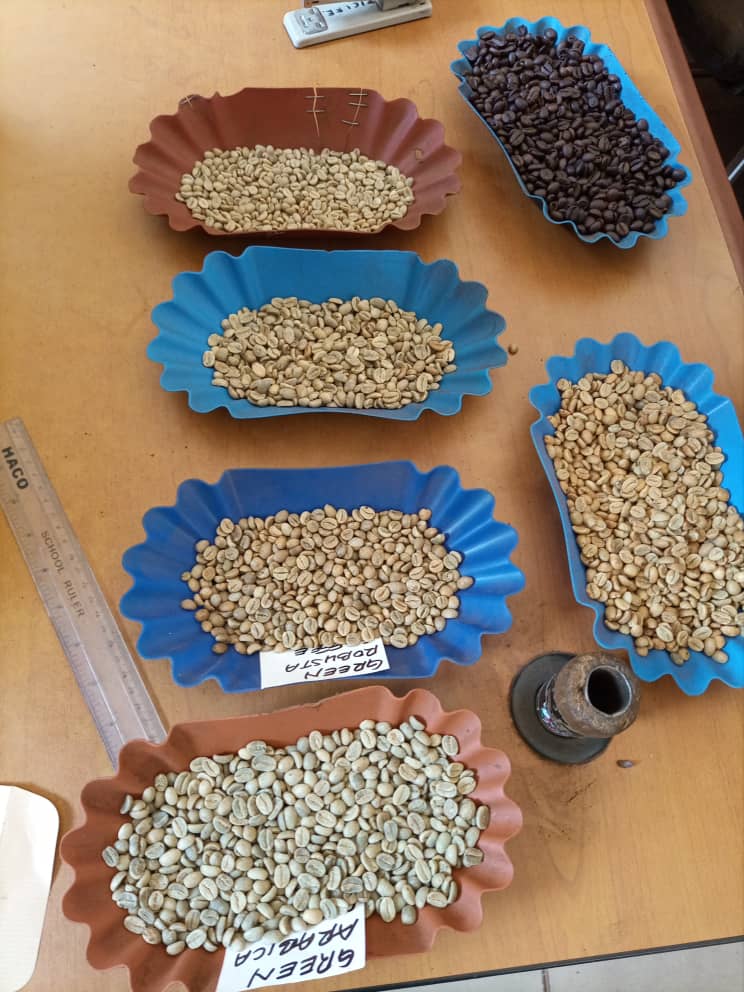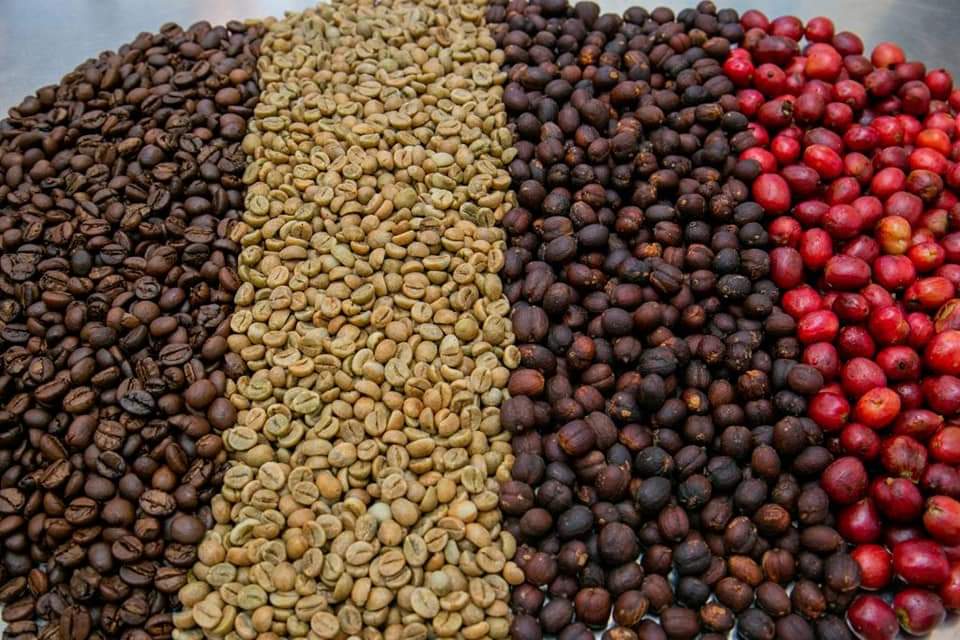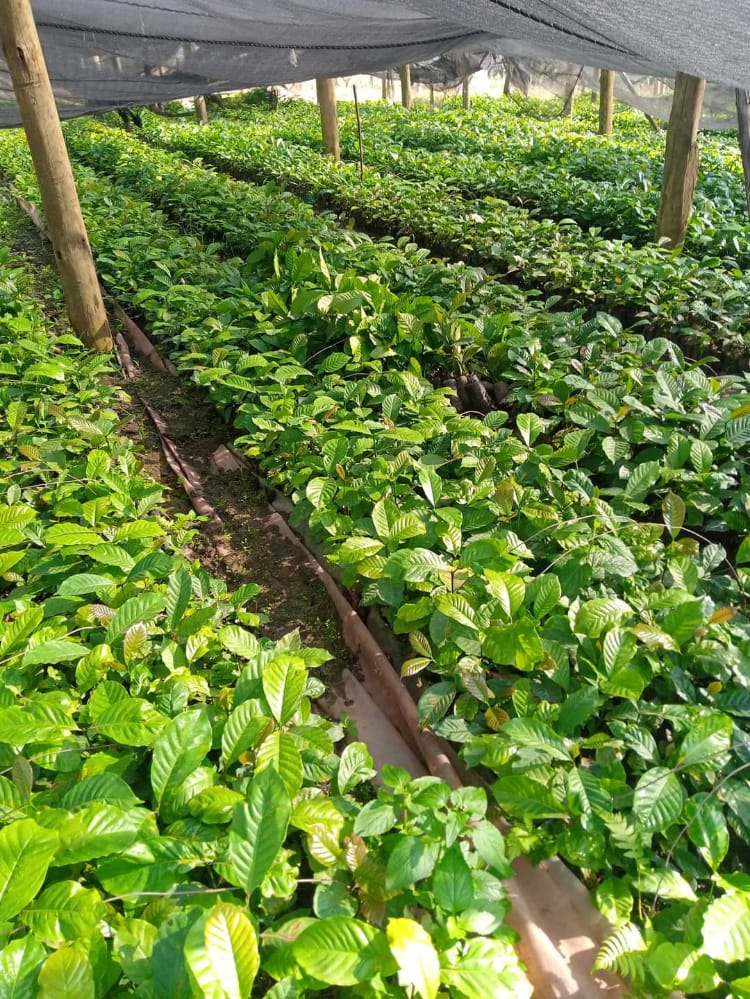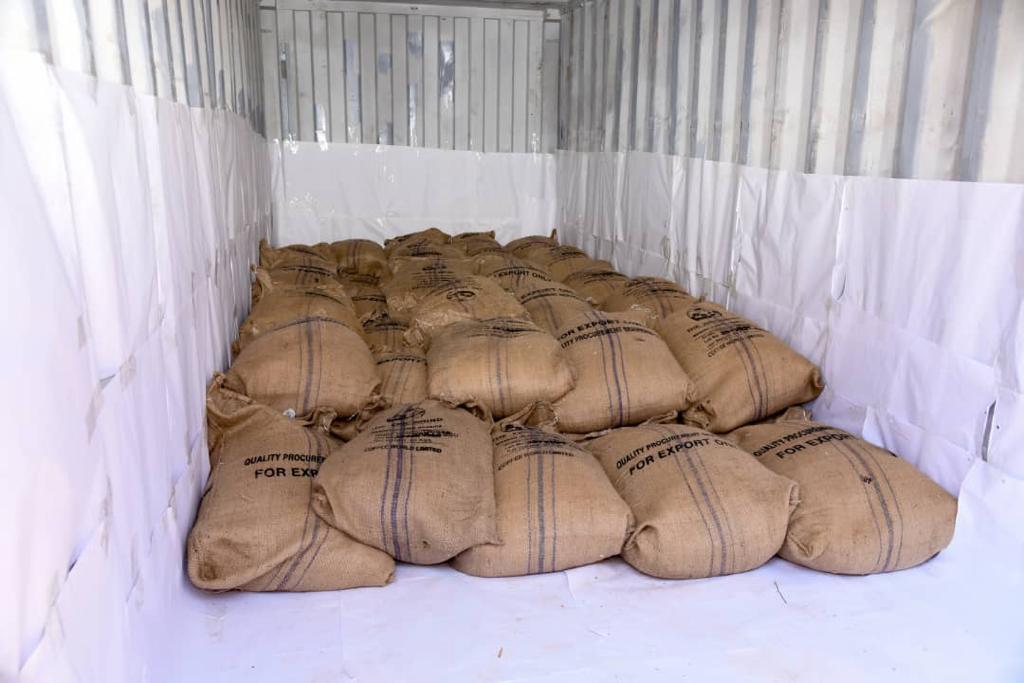
EKARE COFFEE; The Brew of the Gods
In the heart of East Africa lies a country known for many things one of which are its mountains. Mountains with their peaks stretched beyond the clouds; stepping stones for the Gods to descend from the heavens above to care for the lands and people below.
Welcome to Uganda.
Uganda’s mountains have taken on a life of their own as the portals for the Gods from their world to ours; with a collection of fauna and flora that can’t be found anywhere else in the world, a variety of ecosystems existing at different altitudes along the mountains and some of the oldest cultures in human history shuffling slowly into the future; achieving that almost impossible balancing act of staying true to themselves but trying to keep up with change as the need arises.
To the east of Uganda, along our boarder with Kenya stands one particularly proud mountain; Mt. Elgon.
This extinct shield volcano stretches to 4,321 meters at its highest peak called Wagagai.
The Bagisu; the largest tribe living on and around the Mountain, have always known it as Mt. Masaba.
They believe that Masaba was the very first man in creation and he first appeared on earth on the Mountain top.
He came into this world bearing many gifts from the creator among which were coffee beans. The coffee beans were said to be the creator’s favourite drink and he gave to Masaba the secrets for caring for these precious seeds and nurturing them to their full flavor
The Bagisu have carried these coffee growing secrets with them for thousands of years, from generation to generation and even now, in the year 2021, you’ll be hard pressed to find coffee that’s more full of flavor and taste than that grown on the slopes of Mt. Masaba anywhere in the world.
It is this mountain and its people that are at the very heart of the Ekare coffee story. Without them, there would be no Ekare coffee.
Our beginnings;
Agriculture accounts for 60% of Uganda’s economy and just over 70% of all Ugandans find employment in this sector. But with the collapse of farmers’ cooperatives in the early ‘90s which were replaced by long chains of unscrupulous middle men, the farmers who are the main stakeholders in this sector have failed to grow their capacity beyond just selling raw materials.
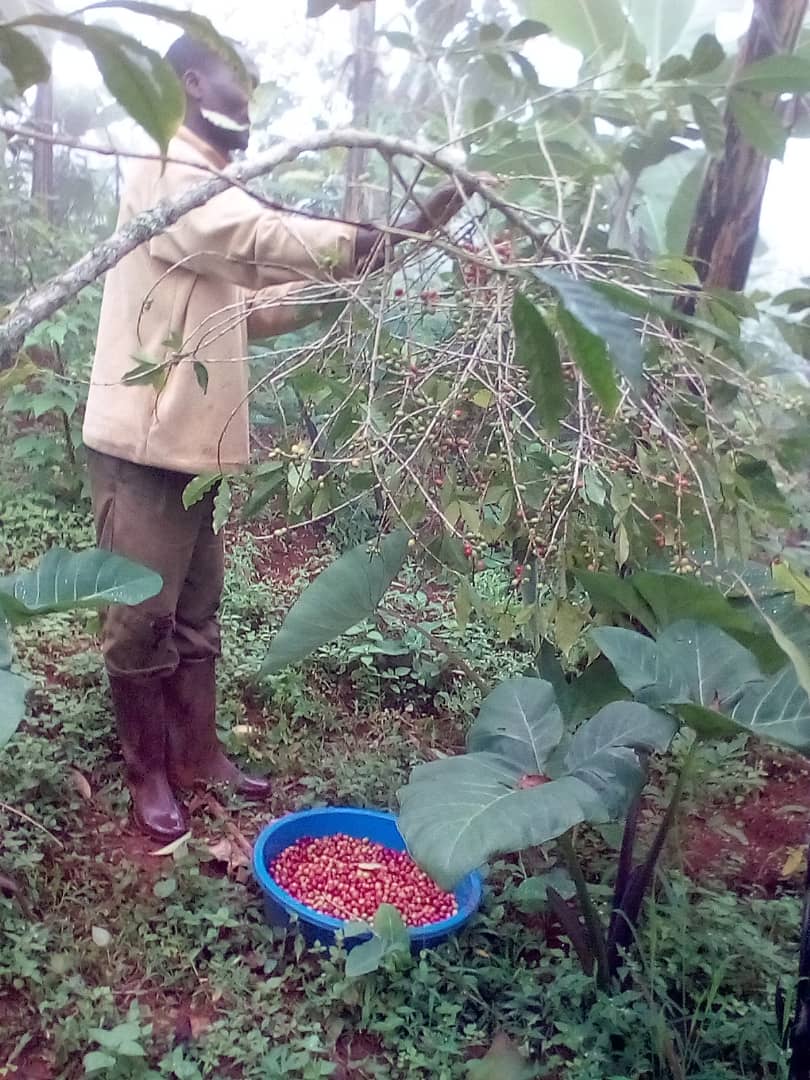
Most small scale farmers; those with small land holdings are forced to sell their produce at ‘farm gate prices’ dictated to them by these middle men who then re-sell the same produce for huge markups further up the value chain.
The farmers are forced to accept this bargain because they sell their produce garden fresh with no value addition whatsoever since they lack the skills, knowledge and infrastructure to do value addition. They also lack access to markets whether to the final consumers or to the factories doing value addition where they can sell their produce at favorable prices.
This situation has negatively affected communities that are entirely dependent on agriculture and the brunt of this communal downturn in fortunes has been largely borne by the women and children.
Operating in the Bugisu region and the Rwenzori Sub region, Ekare Coffee is a community based initiative that begun in the year 2018 with the simple goal of empowering coffee farmers to enable them escape the vicious cycle of poverty and lead dignified lives through coffee farming.
We bring together coffee growers with small land holdings and by adding our tailor made support programs with their unique coffee growing culture, have created and are growing an Arabica specialty coffee growing zone in Uganda. With a taste that you won’t find anywhere else in the world.
Working together with us they’ve been able to increase their coffee production, improve the quality of their coffee and get more per kg of coffee they harvest and most importantly engage in value addition on the berries they harvest.
Our working directly with women in these communities allows them to increase their earnings which has given them an increased measure of self determination over their domestic affairs and quality of life.
We are proof that the whole is greater than the sum of the individual parts.
Our communities
At Ekare, we currently work with 963 families that are entirely dedicated to coffee growing. On average each family has 6 people and that means we are directly impacting 5,778 individuals and counting.
All these livelihoods depend entirely on the growing and processing of coffee berries for income.
Each family has an average total land size of 3 acres and of these, they dedicate around 2 acres exclusively to their coffee gardens. The remaining 1 acre is usually used for animal husbandry with goats, chicken and cows being the most commonly kept to supplement their diet and to provide additional income for the farmers off season.
Coffee has 2 seasons in a year the first one stretching from march-June and the second one running from end of of July-February (main season). Each family from their 2-acre plantations is able to harvest 1.5 tons of coffee per season. Meaning each family is able to harvest 3 tons of coffee per year.
The different stages in coffee production and processing are divided among family members largely along gender and age lines. The men typically clear the land, prepare the land and plant the coffee berries at the start of the season.
Women and children then harvest the coffee and manage it up to the point of parchment just before it is sold. But the men come in during pulping stage of the coffee since it’s a labour-intensive activity.

Coffee is and for thousands of years has been an integral part of the culture and identity of the families in this region and everyone in the community has a role to play in ensuring the quality of the coffee that reaches your cup.
Our Secret Ingredients
There are 3 magical ingredients that guarantee the taste and flavours of our coffee and all of them come from Masaba and the creator that gave him the very first coffee beans and the secrets of the brew of the Gods;
- 1. Soils found on the mountain
- 2. Elevation of the mountain slopes
- 3. Bees
Soils
Mt.Elgon has rich dark and very fertile volcanic soils created by layers of many volcanic eruptions over the course of centuries that carry with them different minerals from deep inside the earth. The dominant soils on the slopes of the mountain are Vertisols, regionally known as “black cotton soils”. These provide a very hospitable home for the coffee beans and as they germinate are well nourished with no need for artificial fertilizers.
Elevation of the mountain slopes
The elevation provided by the Mountain ensures two things for our coffee beans; fresh mountain air and minimal contact with human activities. Ours is Highland Arabica specialty coffee grown at higher altitudes on the mountain slopes. The mountain air is vastly cleaner and less polluted than the air at lower altitudes and also because of the altitudes the ecosystem has remained largely untouched by different human activities ensuring the quality of the soils and isolating our coffee from diseases and pests that affect coffee farms in the middle of busy human settlement areas.
The natural ecosystem
This semi-isolated wilderness our coffee is grown in has lots of bees as some of its most important players. Their numbers ensure effective pollination of our coffee flowers. Mixing pollen from both wild coffee and domesticated coffee and from different coffee varieties. This ensures that the quality of our coffee keeps improving from season to season since the bees help in keeping the gene pool healthy and vibrant.
Sub types of coffee
The coffee grown on the slopes of Mt. Elgon is Specialty Arabica Coffee and has 2 distinct variations;
- 1. Washed coffee (Wugar)
- 2. Unwashed or Dry Ugandan Arabica (Drugar) coffee
Washed coffee (Wugar)
This coffee has a distinct honey flavour to it and in some circles is known as honey processed coffee. It is semi processed coffee; we handle the coffee up to the pulp stage but we don’t wash the pulp and this creates that distinct honey flavour in the beans.
Unwashed or Drugar coffee
This coffee has a very fruity taste to it and is prepared by drying the coffee berries immediately after harvesting them to bring the moisture levels in them down to a desirable level. They are then hulled to bring about the fruity flavour.
Fair pay for fair work

We believe in fair pay for fair work and everyone we work with is paid for their work at all the stages of coffee production. This ensures our farmers are able to focus on coffee production and handling and perfect their craft while leading lives of dignity and ensuring their own economic survival.
Before we stepped in to start working with them, farmers in the region used to earn 4,000 Uganda shillings (1.08USD) per Kg of coffee they harvested from their gardens, processed up to parchment level and sold to middlemen.
After we started working with them, the very first thing we did for teach them that drying their coffee berries on the bare ground was depreciating the quality of their beans and so we gave them raised drying beds and tarpaulins to use in drying their coffee. This resulted in an increase in the overall quality of their berries which we now buy from them at 7,000 Uganda shillings (1.89USD) per Kg processed up to parchment level.
We also pay our farmers and their family members for the work they do at each stage of processing the coffee berries after harvesting.
We buy the berries from the men at harvest time and because the women and children do most of the work processing the beans, we pay them directly for the work they do at the different stages of processing. This means that their earnings are not in any way tied to or controlled by their husbands and thus have a greater say in the use of resources coming into the household because of this increase in their financial independence and empowerment.
Giving the women of this region economic independence has seen an increase in the overall welfare of their families as they tend to focus their earnings primarily on their children and maintaining their homestead. We have seen more children going to school with all the necessary scholastic materials and an uptake in access to medical services in the communities we work with.
Their commitment to handling the coffee because of all it has done to improve their station in life is perhaps the true secret of our spectacular quality coffee.
Skilling coffee farmers
We have deep rooted partnerships with the communities and families that we work with that goes further than just money. We train them and teach them new skills they can use in coffee growing together with the skills passed to them by their forefathers. This blend of old and new; resting the knowledge of today on the foundations of yesterday means the best of both worlds and through this we guarantee the quality of your cup of coffee.

Some of the skills we have trained our partners with include;
- Training them on better storage practices; previously they stored their coffee in the same spaces they kept their farm animals but we have since trained them and supported them to establish better coffee storage facilities in each of their homesteads.
-
Some farmers operate nurseries which are a source of plantlets for the other farmers. We have gone ahead to ensure the success of these nurseries since they are the source of the best coffee beans in the world for generations to come. And we make sure that they know the value of what they carry as well as understanding the responsibilities that comes with.
We train them on preparing the nursery to make sure it is ready to receive the seeds and seedlings, train them on how best to dry the seeds to prepare them for planting, how to nurture the seeds until they germinate, measuring the distance between each coffee plantlet to ensure they all have sufficient space to grow, to measure how high each plantlet should be before it is ready to be transferred to the main garden and how to transfer the coffee to the main garden.
We enjoy supporting these nurseries and teaching their owners them on operating a good nursery.
- We also skill our partners on preparing and using organic fertilizer methods; cow dung and husks (which are collected as they pulp the coffee beans) which are collected and put in a pit where they decay and are then transferred to the garden as manure.
Establishing SACCOs
These are savings and credit organizations that cater for different interest groups; men, women and other needs. They allow members to save and pool their money together, lend to each other at low interest rates, or to jointly undertake ventures that require a significant capital to begin. In an area where bank penetration is very very low, these SACCOs are a financial lifeline for the members of these communities and we are proud to have played a part in helping them set up these organizations.

Working with us
We take this opportunity to offer you a distributor partnership with Ekare Coffee. Where you will be solely responsible for taking our coffee to the North American continent.
We can supply you coffee packaged in two different ways; the first being packed in ready for supermarket shelves paper bags of 250gms and 500gm with the Ekare logo branded on them.
These are best for consumers buying Ekare for their personal consumption and to share with friends and family. We can supply you with as many of these as you order for.
The second type of packaging is where we seal 60kgs of prepared coffee beans in grain pro bags and place those sealed grain pro bags inside a sisal bag also known as gurney bags and ship to you.
This approach requires you to package the coffee beans to your specifications to resell to customers but indicating on your packaging that the coffee was sourced from Ekare coffee.
We can supply you with as many kilograms as you need.
Under this arrangement you would be required to pay upfront half of the total value of coffee you order for and pay the remainder of the money owed two months after receiving the coffee. Our role would be to prepare the coffee and transport it to the pickup destination and after that the cost of insurance, handling and freight to its final destination will be on you.
Even though the Ekare story ultimately belongs to the families we work with to make this heaven sent brew, they would not (and neither will we) be against you sharing that story with your own customers in your marketing and sales efforts. It is a story we want to share with the world while retaining control over how it is told.
The quality of our coffee speaks for itself and we promise you to always ensure the same quality in every bag of ours we supply you with.
Ekare is more than just a company and a brand; it’s a story. A story of heritage, of culture, a story of pride of belonging and what happens when people come together to achieve greatness. Ekare is representative of the collective aspirations of the people from the Elgon region.
We are sharing all this with you and the rest of the world because some things are too good to be kept to ourselves.
Join us as partners and walk this long journey with us, telling the Ekare story and exporting our brand across the globe.

